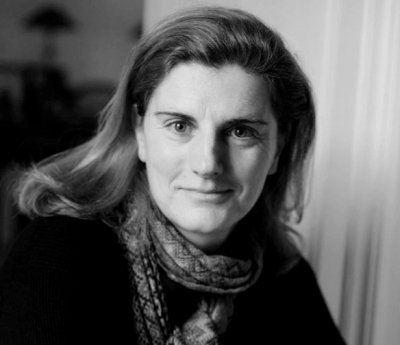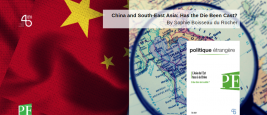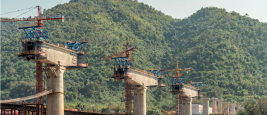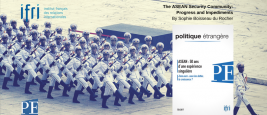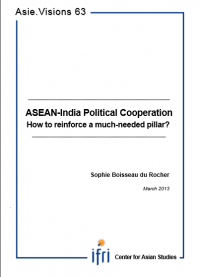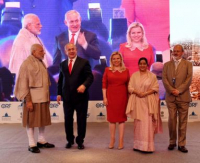
Sophie BOISSEAU du ROCHER
Former Associate Research Fellow, Center for Asian Studies
Research Interests:
- Political and geostrategic issues in Southeast Asia
- ASEAN regional construction
- China / Southeast Asia (ASEAN) relations and their global implications
Sophie Boisseau du Rocher is a Senior Researcher specializing in Southeast Asian politics, geostrategic affairs and regional integration. She was an Associate Research Fellow at Ifri's Center for Asian Studies from November 2015 to December 2023. She is the author of numerous books and articles, including Le Cambodge, la survie d’un peuple (Belin, Paris, 2011), L’Asie du Sud-Est prise au piège (Perrin, Paris, 2009) and L’ASEAN et la construction régionale en Asie du Sud-Est (L’Harmattan, Paris, 1997). She also edited the Annuaire de l’Asie orientale (Yearbook on East Asia) for the Documentation française (2006 – 2012).
Dr. Boisseau du Rocher holds a PhD in Political Science from Sciences Po, Paris (1996) and has previously taught at Sciences Po Paris, Sciences Po Le Havre (Asia campus), the Institut des hautes Etudes de la Défense nationale (IHEDN), and the Collège Inter-Armé de défense. She managed the Observatory on Southeast Asia for the Directorate of Strategic Affairs of the French Ministry of Defense from 2008-2011.
The February 2021 coup encountered a level of resistance that the military did not expect: demonstrations, boycotts, and a slide toward an armed resistance against repression from the authorities.
China is exerting pressure on its surrounding area in South-East Asia to implement its concept of a “community with a shared destiny”.
As a frontline zone and a pivot, Southeast Asia is both a testing ground and a showcase of China’s ambitions in developing a grand cooperative scheme. Creating mutually positive linkages is crucial for both partners, if not for the same reasons.
China increasingly sees its flagship foreign policy project as a tool for restructuring global governance and a vector for promoting a new form of globalization.
The Rohingya issue involves a complex national and regional history.
The Association of Southeast Asian Nations (ASEAN) strives to deal with security problems in an inclusive and flexible way. In 2003 it established a Security Community which has since expanded through several institutions and partnerships.
In the South China Sea, the field of marine science could be seen as a catalyst for functional cooperation in the region. In reality, it often reflects regional asymmetries and has become yet another domain in which the weight of China is ultimately a destabilizing factor, according to Sophie...
India is one of Southeast Asia’s principal neighbors and there is certainly great potential for cooperation with the region and its institutional representation, ASEAN. But does India properly exploit this opportunity? Is Southeast Asia satisfied with the level of engagement?
If India has long been perceived, and rightly so, as a reluctant player in international affairs, but that perception is quickly coming to an end. Indeed, by organizing a major international forum, the Raisina Dialogue, for the third year in a row, Delhi is signaling that it is now seeking to...
Philippines' President wants to limit islamist groups' capacity after several attacks in the South of the country.
On December 31, 2015, ASEAN launched its long-anticipated Community with relatively little fanfare. This low-profile attitude surprised many observers: announced as a milestone and the signal of the member-states determination to bring regional cooperation “to a higher plane,” the launch was...
La question des Rohingyas est plus complexe qu’il n’y paraît.
...


